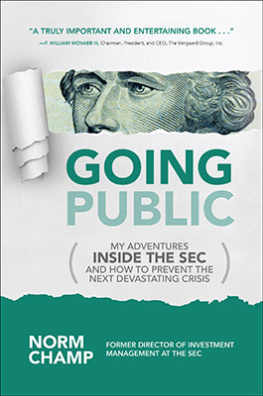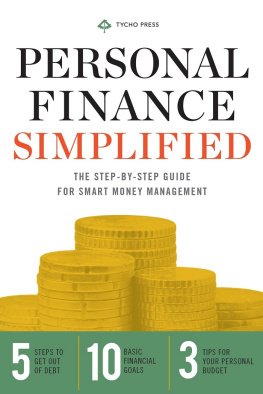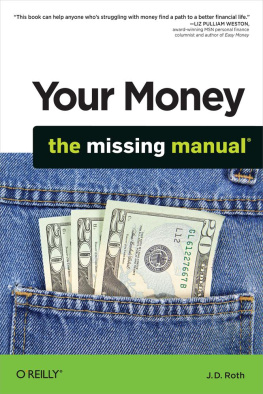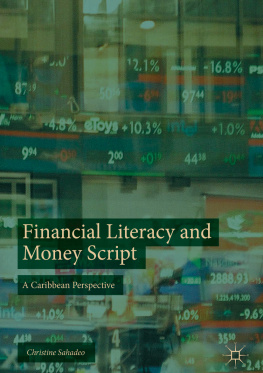If you enjoyed this book, discover your next great read with the following excerpt.
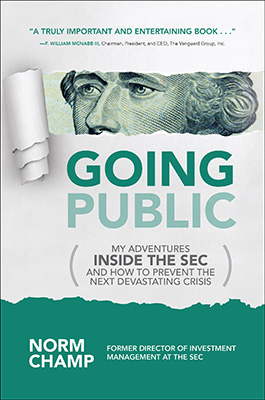
CHAPTER
FISH OUT OF WATER
Hes got more guts than sense.
To Hell and Back (1955)
FIRST DAY
On January 25, 2010, I dropped two of my sons at their school in Manhattan. It was a typical cold winter day in New York City with the added twist of severe winter storm warnings bearing down on the city. After saying goodbye to the boys, I jumped on the express subway train and headed downtown to report for my first day at the New York regional office of the U.S. Securities and Exchange Commission (SEC) at the World Financial Center. The SEC is located in the American Express Tower building, which has tight security procedures, so I had to wait near the buildings main security desk for an administrator to come get me. Upstairs she handed me two thick black binders of the statutes governing federal employment and explanations of federal employee benefits. This was my first day as an employee of a U.S. government agency, and no one gave me an orientation. No one discussed onboarding for my duties. No one gave me a job description of my responsibilities in my new role as head of examinations of investment firms in New York and New Jerseyor advised me of the problems at the SEC and other regulatory agencies supposedly leading our nation out of the 2008 financial crisis.
Eventually, as there was no clear label for my position, I made up my job title for my business card: Associate Director of Investment Management Exams for the New York Region. The formal name of the nationwide SEC Exam office is the Office of Compliance Inspections and Examinations, a label that reminded me of some shadowy bureaucracy out of Dickens where people will be doing things to you with cold steel. SEC staff and we in the industry simply called it Exam or OCIE. The office conducts examinations by visiting broker-dealers, investment adviser and investment companies, securities exchanges, clearing agencies, transfer agents, and credit rating agencies to assess their compliance with the federal securities laws. Exam leaders decide which firms to visit and then send a team of examiners, typically from one of the SEC regional offices, to go to the firm and review trading records, e-mails, and the like to look for any wrongdoing. For investment management firms, Exam employs about 450 investigators covering more than 12,000 firms, so it relies on the data that firms present to decide on which companies to review. As part of this new adventure I was embarking on, I would now supervise about 100 of those 450 examiners, and we were responsible for policing investment managers in New York and New Jersey, where the bulk of the investment assets managed in the United States are located.
After having an ID picture taken, I sat in my office and thought about what to do first. My mind drifted back to a lunch I had a few months before with a high-ranking SEC official while interviewing for the job. He and I met at a Cosi restaurant in what was then the dingy food court of the World Financial Center. We grabbed salads, and I offered to buy lunch since I was in the private sector and not on a government salary. He said that as a government employee he couldnt accept lunch from someone in the hedge fund business.
We squeezed into a booth. After eating quietly for a few moments, he looked over at me.
Listen, he said. If you leave your job in the hedge fund business and come to the SEC hoping to change how exams of investment firms are done, certain employees in the New York office are capable of anything in trying to stop change.
I told him that I thought my expertise in the investment management business could be helpful to the examiners after the SECs spectacular failure to discover the massive frauds committed by Bernie Madoff and Allen Stanford. He responded that some of the supervisors and employees in the New York office would resent any help from the outside, particularly from someone like me who had not conducted exams before.
When I asked what these people might do, he said that they could try to ruin my career. I was taken aback by these words, but I could not believe that examiners at an agency that had failed to detect fraud would not want assistance from someone with a background in the investment fund world.
I would soon be proved very wrong.
Later that day, back in my office at my hedge fund firm in Midtown Manhattan, I thought over what this official had said but was undeterred in my desire to join the SEC. I wanted to serve my country at this difficult time and believed I had the experience and legal expertise to handle myself in this new world. Looking back, I can see I was also a little naive in thinking that an organization that had suffered a massive failure would be open to outside help. During 20 years in the private sector practicing law and serving as general counsel of a hedge fund, I interacted with the SEC both as a lawyer seeking approval of transactions for clients and as an industry representative trying to educate the SEC staff about hedge funds. It was clear to me that many SEC employees did the best they could on hedge fund issues, but the agency had few people with expertise in the field. I had registered our firm with the SEC in the early 2000s and helped expand the business to offices in London, Hong Kong, and mainland China, working with regulators in all those places. I respected the regulators I worked with in the United States and abroad for their dedication to public service and for their efforts to police the industry. But the boom real estate market of the mid-2000s was too frothy to last, and I knew that a slowdown was inevitable, although in my wildest nightmares I did not foresee the massive crash of September 2008. After the crisis hit, I found it difficult to fathom what happened at the SEC, which was so embarrassed by its failures and savaged by critics in politics and the media that I had to avert my eyes.
I believe in the power of the U.S. securities markets and the prosperity they have brought the country for more than 200 years by providing capital for innovative businesses. Such healthy markets periodically produce manias like the one leading up to the 2008 crisis, but they also finance businesses too numerous to list. The usual sign of impending disaster is the inevitable article saying that this time is different. Many such pieces ran in 2006 and 2007 predicting that real estate would keep rising in value. I worried that the reaction to the crisis would harm the position of the United States as the financial center of the world. I believed my expertise in private funds and securities laws, which I had spent 20 years building, would be helpful to the SEC as it tried to recover from its debacle. So despite the prescient warning, I continued with my application to join the SECs New York office.
Once Id made the decision, I felt excited to be entering public service for this great countrybut also hesitant about what was to come. I gave up a partnership in a prestigious, established hedge fund manager at a time when my wife and I were raising four kids. I was not only taking a massive pay reduction but also stepping out of the industry where Id made a good career. Happily, despite the challenges, it turned out to be the best experience of my working life.
I had been hired by New York office head George Canellos, with the approval of SEC chair Mary Schapiro, to overhaul the SECs processes in order to unearth the next Madoff or Stanfordbefore that person fleeced unwitting investors. When I started, the fallout from these failures was still reverberating. The SEC inspector general (IG)a position created by Congress to investigate legal and compliance deficiencies and failures within the commissionhad issued reports on the Exam divisions blunders. Congressional committee members demanded answers. The press was doggedly examining the negligence of the SEC.
Next page
